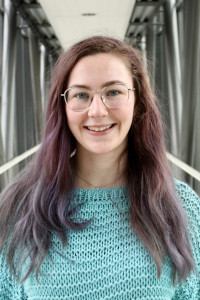Nina Bakker
RESEARCH:
The cell is a crowded environment through which vesicles need to find their way for the transport of many essential molecules. Instead of moving from one side of the cell to the other in one go, these vesicles move in a back-and-forth manner (“bidirectional”). Although this seems like a rather inefficient way of transport, the fact that bidirectionality is common for all vesicle types suggests that there is a general (and important) explanation. One of the key players involved in the regulation of vesicle transport is the ER, which controls the loading of motor proteins. However, what factors determine the transport direction of vesicles remains incompletely understood. By focusing on endosomes and lysosomes, the aim of my project is to understand why vesicles show this characteristic bidirectional movement.
CURRICULUM VITAE:
After a bachelor in Biology, I did the master Biomedical Sciences in Leiden. For my first internship, I looked at the role of thrombosis-related proteins on brain cancer progression. For my second internship, I joined the Neefjes group and worked together with Marlieke Jongsma to study bidirectional vesicle transport. After graduating in 2021, I stayed at the Neefjes group to continue working on this project as a PhD student.




